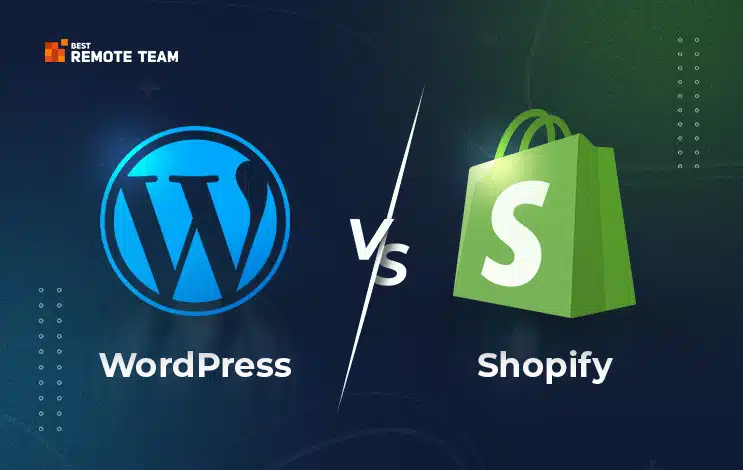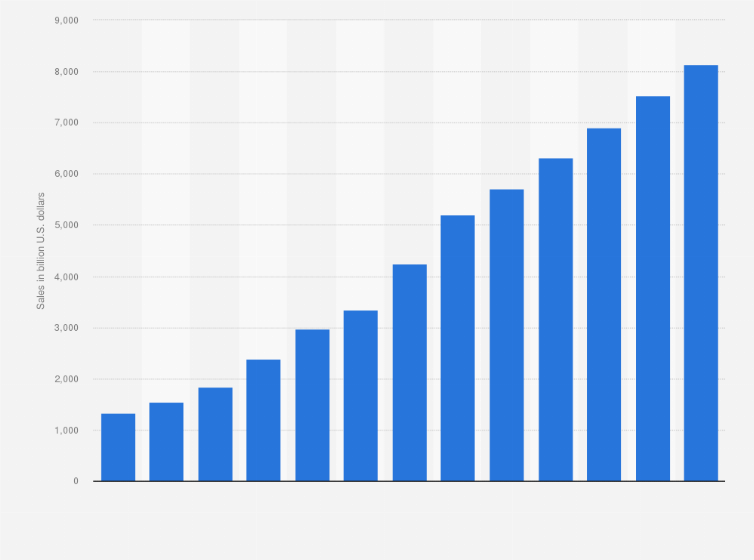Overview of WordPress
WordPress is one of the most significant and popular web content management systems that powers several websites and blogs. With several in-built themes and plugins, it dares the developers to innovate and create personalized websites.
As it is an open-source software solution, you can customize the source code to meet your unique codebases. As a versatile platform, it helps build websites, forums and portfolios. You can also build a WordPress website with diverse e-commerce plugins and inbuilt themes.
Let’s look at the top features that extend the WordPress website functionality to build eCommerce websites.
Top WordPress Features
#1) Flexibility
It is a highly flexible and diverse platform that helps build complex and highly content-centric websites. As it is an open-source platform, you can easily modify it to build unique web solutions.
#2) Customization
You can easily customize the source code to build unique functionality or aesthetics. The in-built themes and plugins can help you design for the customer.
#3) In-built Themes
Whether you are a professional designer or a beginner, you build your store with in-built themes. You can choose from a range of paid and free themes that help you style and brand the website.
#4) Content Management
You can easily create, organize and edit content with this eCommerce website. It helps you implement all content types suited to your business needs.
#5) In-built SEO
As WordPress comes with in-built SEO features and plugins, it enhances your website’s visibility. WordPress helps you garner a global reach with your eCommerce website.
Pros of WordPress
#1) Diverse Plugins
You get diverse in-built plugins and themes to help you build an aesthetic front end. You can use these plugins to include the desired features and functionality.
#2) Flexibility
You can build diverse websites with WordPress. You can go from blog development to an eCommerce website with this open-source web framework.
#3) Complete Ownership
You have complete control over the website development as the source code is open for you.
#4) Integration
You can easily integrate with third-party websites and tools like email marketing and analytics.
#5) Scalability
it is easier to scale your projects with WordPress owing to its source code abilities.
#6) Community Support
As there is extensive community support, you get resources to hire. Moreover, you can build websites with greater ease with WordPress.
Cons of WordPress
#1) Maintenance
You need to maintain the website regularly to meet the new plugin and theme updates. If you miss an update, it can lead to security vulnerabilities.
#2) Security
While WordPress is relatively good with security, it doesn’t offer advanced techniques. As a result, your website may fall prey to vulnerabilities. You must hire remote WordPress developers to help with your website security requirements.
Did you choose WordPress over Shopify? Make sure to secure your site with our WordPress Security 101 guide.
Overview of Shopify
Shopify is a SaaS-based online store development solution that helps small businesses gain online visibility. With uniquely defined plans and extensive features, it enables small businesses to get started with minimal support.
In-built themes, content-specific solutions and drag-n-drop design tools help you create aesthetic and personalized storefronts.
It can handle all the backend-related tasks including product sourcing, inventory management and sales.
Features of Shopify
#1) Hosted
As a fully hosted platform, you need not worry about server-side communication, networking or maintenance with Shopify.
#2) Theme Store
There is an entire theme store dedicated to extensive themes that you can use for website development. These in-built themes are professionally designed and help improve the branding and aesthetics of the store.
#3) Inventory Management
As it is an eCommerce-specific platform, you get all the tools that help with inventory management. You can look into product variants, stock levels and product monitoring with these tools
#4) SEO Tools
The Shopify SEO tools help you improve the visibility of the store. It can help you build suitable meta tags and URLs that convince Google and other search engines of your credibility.
#5) Marketing & Analytics
There are built-in tools that can help build excellent marketing campaigns and offer personalized discounts. Moreover, it also helps with analytics to help improve tailored recommendations for your user.
Pros of Shopify
#1) User friendly
It extends a user-friendly interface, making it accessible to all. You don’t need excellent technical knowledge to handle the Shopify platform.
#2) Hosted solutions
As it is a hosted platform, you need not worry about maintenance or security. The platform will take care of these features.
#3) Mobile responsive
You can easily create mobile responsive designs, thus offering consistent experiences across devices.
#4) Ecosystem
Shopify has evolved since its inception. As a result, you can interact with the app or theme store to get several themes and add-ons. This strong ecosystem helps extend your app’s functionality and enhance its usability
#5) Customer support
There is a strong community supporting Shopify developers. You can rely on their assistance to overcome bottlenecks and introduce new features.
#6) Scalability
As it is a SaaS-based platform, you can easily scale it to suit your newer needs. Expanding a Shopify store is easier and faster.
Cons of Shopify
#1) Monthly expenses
As it comes with a subscription-based model, you must pay for the features you use. It can add to your fixed monthly expenses. In some cases, you might spend more than your budget to develop the eCommerce store.
#2) Data portability
It is slightly difficult to migrate your data from Shopify to other platforms. This can become a bottleneck should you want to switch to another platform.
#3) Vendor lock-in
It is a hosted solution with a strong ecosystem. You may have less control over the software or the source code. This could put you into a locked-in situation with restricted control.
Detailed Comparison of Shopify vs WordPress
We have seen how Shopify and WordPress help build online stores for your business. Let’s look at which is a better platform and why.
#1 The Cost- Initial Setup and Ongoing Maintenance
WordPress: You must choose a hosting provider for WordPress, which can add to your cost. Apart from this, you must add the theme, plugin and SSL certificate cost to your initial setup expenses.
In the case of premium subscriptions for themes or plugins, you must include them in your setup expenses. The ongoing expense would include the maintenance of the WordPress store. This would depend on the maintenance type and the skillset of the developer.
Moreover, you must also add the security costs to your expense sheet. The WordPress solution needs dedicated developers to induce the right security.
Shopify: This is a subscription-based platform, which means you have to pay a fixed amount to use the platform. You have to pay for every transaction made on this platform. Moreover, the apps and ecosystem used to extend functionality are also paid.
Ongoing costs include domain renewal, theme and overall upgrade charges. You must also include the costs for adding security and compliance to the platform.
Summary: When you look at the two, it is clear that Shopify offers a more planned and structured budget. You are well aware of the fixed and variable expenses. However, in case of WordPress, it will depend on your choices. WordPress may be cost-effective for the standard choices you are making.
#2 Ease of Use
WordPress: WordPress is renowned for being flexible and a beginner-friendly platform. It can help you get started with a low learning curve. It is excellent with content management. However, when it comes to incorporating eCommerce features, you might need to undergo extensive configuration.
The initial setup time will differ according to the customizations needed. It also depends on the themes and familiarity with the platform.
Shopify: It is a user-friendly platform that offers ease of navigation. You can create simple and aesthetic designs with this platform. As it is a SaaS-based platform, it is easy to set up and get started. You don’t need tech expertise to use Shopify.
Moreover, owing to the SaaS background and streamlined processes, it ensures quick setup.
Summary: When it comes to ease and time taken to set up, Shopify wins. However, when it comes to flexibility, you must go with WordPress. However, the longer setup time and configurations needed for eCommerce put WordPress in a tough spot.
#3 Customizations
WordPress: As the source code is open and available, you can create unique features and functionality with WordPress. Moreover, you can personalize the user’s experience to meet unique needs.
The in-built themes and plugins are designed to improve the website’s customization abilities. You can create diverse designs and innovations with WordPress. Moreover, you get page builders like Divi and Elementor with WordPress to enable better results.
Shopify: You can easily customize the look and feel of your online store with this platform. It is easy to adjust the colours and fonts to suit your distinctive needs. Moreover, there are diverse third-party apps that can enable better design and functionality.
There are various official themes and plugins that can help you build an e-commerce website with Shopify. You can create stable and reliable solutions with the framework.
Summary: Both platforms offer capable and reliable customizations to support your unique business needs. There are limitless possibilities with both platforms. You can choose the build the store the way you want with either platform.
#4 Design Flexibility
WordPress: WordPress is known to be very flexible. You have complete control over the source code, which enables you to control the design dynamics too. You can easily re-create the designs to meet your aesthetics.
Shopify: The flexibility offered by Shopify is more structured. It works with a predefined framework. If you operate within the framework, you can customize the design, layout and functionality of the Shopify stores.
Summary: WordPress is highly flexible while Shopify offers structured flexibility. You must choose the framework that fits the flexibility needs exuded by your business.
#5 Payment Processing
WordPress: When building an eCommerce website, you must consider comparing the specific features. Payment processing is an important part of an online store. WooCommerce is the plugin used to enable online payments in WordPress. This plugin supports diverse options including PayPal, Stripe and Square.
You can easily customize the payment methods to suit your unique needs. You can also add multiple currencies to the payment gateways. Additionally, you can set the default payment settings as well for the users.
Shopify: There are in-built payment gateways that you can use to enable online payments. Apart from this, you can also integrate your store with third-party payment gateways.
Shopify, like WordPress, supports multiple currencies. Apart from that, it also supports taxation and other calculations based on the location.
Summary: Both WooCommerce and Shopify offer excellent payment processing features. They can help customize your eCommerce payments to support your demographic needs. However, when it comes to experiences and seamlessness, Shopify is better. As it is built for eCommerce solutions, it is more intuitive.
#6 Scalability
WordPress: This is a scalable platform. You can grow your website as your business grows with minimal resources. It is easier to expand the pages to meet the new products and categories you have created.
You can easily implement the plugins to meet your large inventory demands and simplify the complex structures.
Shopify: This platform was designed to enhance website scalability. You can easily meet your growing business needs with Shopify. The in-built scaling feature allows you to manage the traffic with ease. You can also create a more responsive design to match the sale seasons.
Summary: While both platforms support scalability, they look at it in different ways. WordPress offers an optimized way to scale your website. You might need to manage the server and other resources to optimize the site for your scalability needs.
Shopify is designed for scalability. You can easily optimize the server and match your traffic spikes with the in-built feature.
#7 Security and Maintenance
WordPress: WordPress website maintenance and security are a crucial part of any eCommerce website. It is important to update the plugins and themes to ensure smooth functioning and better security. You might need to opt for manual updates that can take up resource time.
Moreover, it can cause compatibility issues. You must use all the backup plugins to enhance the app development.
When it comes to security, there are plugins that you must integrate to resolve issues like firewall vulnerabilities and login threats. Your users must choose the right hosting and permissions to secure. It is not automated from the platform.
Shopify: Here are all the ways in which Shopify supports the maintenance and security requirements of your website.
As it is a hosted platform, it automatically updates your website with the latest components and patches.
The platform offers automatic backup for the website. It reduces the time and effort needed for manual backup.
Shopify offers several built-in features that allow you to implement security features such as DDoS protection and data encryption.
It also extends support for SSL encryption and PCI compliance. The platform offers regular security updates and ensures minimal risks.
Summary: Whether maintenance or security, Shopify supports your needs with more in-built solutions. It uses a more hands-off approach for the upgrade and security. Moreover, it extends automated backups.
WordPress is more manual and resource-intensive in both security and upgrade. As a result, you might want to choose Shopify over WordPress when it comes to seamless maintenance and security.
Case Studies
Real-world WordPress Success Stories
Root Science: This organic skincare brand chose the powerful combination of WordPress and WooCommerce to build its modern online store. You can easily shop the collection from this intuitive WordPress website. The interface is sleek and the navigation is brilliant.
Disruptive Youth: An activewear company, chose WordPress to build its shopping store. They have arranged numerous products with high-quality images on their online store. Moreover, the store learns all about the user’s interests and personality from their interactions.
Shopify Triumphs in E-commerce
Best Self Co: The product-based eCommerce store introduced a content-driven ecommerce website that helped them increase sales. They used Shopify to create an intuitive and aesthetic front that would attract their user base. The business has also built a strong community to enhance its acquisitions.
UKIES Shoes: This online shoe store has integrated several plugins and tools with Shopify. This can help build email lists and manage their inventory. The in-built SEO has enabled them to improve their visibility. They have ensured high-quality images on their storefront for quicker decision-making.
When to Choose Shopify vs WordPress
It is crucial to know when you must choose Shopify over WordPress and vice versa.
When to Choose Shopify for Your Store?
- When you want to initiate a quick setup and get started with your online store.
- If you want a self-hosted and secure solution that handles maintenance and updates.
- When you aren’t tech-savvy and cannot invest in an expert to handle your eCommerce requirements.
- If scalability and performance are key to your store’s purpose.
When to Choose WordPress for Your Store?
- If you want complete control over your store’s design, hosting and functionality needs.
- You want a more customized and advanced platform that offers limitless design possibilities.
- If you want to build a robust website, a strong payment system, and a credible blog.
- If you want to deliver solutions through the content-centric methodology.
You must hire a Shopify developer or a WordPress expert to accomplish your goals with the platform.
Conclusion
Shopify is a great choice if you want a seamless setup experience, low maintenance and hassle-free development. However, WordPress is your go-to platform if you want to prioritize customizations and content marketing.
Shopify offers better security and simplifies design workflows when compared with WordPress. When choosing a platform for your eCommerce website, you must look at the objectives. You should also consider the design requirements and your in-house expertise.
Best Remote Team can help you with the resources required to build a capable eCommerce software solution. Our experts will work closely with you to deliver the right team with a cost-effective engagement model. We can even help you hire dedicated Shopify developer or WordPress development team for your website.






